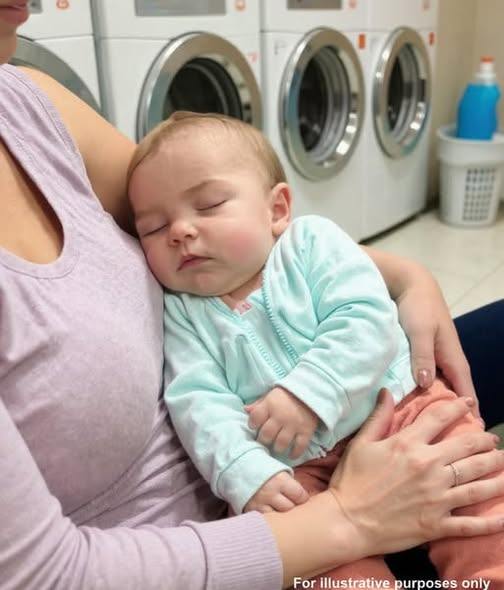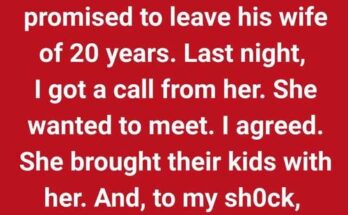After working through the night at the pharmacy, I could barely keep my eyes open. My body felt heavy, my thoughts foggy, and all I wanted was a few hours of sleep. But real life doesn’t pause for exhaustion, especially when you’re caring for a baby on your own. So instead of crawling into bed, I bundled up my seven-month-old daughter, Willow, gathered an overflowing bag of laundry, and walked to the laundromat down the street.
I had no idea that an ordinary morning would turn into something I would remember for the rest of my life.
Willow was at that sweet, gentle age when she smelled like warm milk and her soft laugh could quiet any worry pressing on my heart. Her father had stepped away long before she was born, and I had stopped hoping he might come around. Life became simpler after that—harder, yes, but clearer. It was just Willow, my mom, and me moving forward day by day.
My mother, now in her early sixties, helped whenever she could. She’d already raised her children, yet here she was again—bottles, diaper changes, sleepless nights—and she never once made me feel like it was too much. Still, I carried a tight knot of guilt for needing her so often.
We lived in a tiny rented apartment without a washer or dryer. Normally, I did laundry on my days off, but this week every shift had turned into a double shift. I was worn down to the bone. So after my overnight shift ended, instead of going home to sleep, I pushed myself toward the laundromat.
Inside, the hum of machines vibrated through the warm, soapy air. Only one other customer was there—a woman in her fifties who gave me a friendly smile.
“What a beautiful little girl,” she said.
“Thank you,” I replied, rocking Willow gently.
When the woman left, it was just me, Willow, and rows of spinning machines. I loaded the washer—onesies, towels, my uniforms, even Willow’s little elephant blanket—and dropped in my last few quarters. Willow fussed softly, so I gathered her close and wrapped her in the only blanket within reach, one waiting to be washed. She settled quickly, her head tucked under my chin.
I sat down on a hard plastic chair. The rhythmic churn of the washer felt soothing. I told myself I’d just rest my eyes for a moment.
Then the world went dark.
Sunlight slanted across the floor when I opened my eyes again.
My heart leapt in panic. I checked Willow first—safe, still asleep, warm against me. Relief swept over me, but confusion followed quickly. How long had I been sleeping? Why was the laundromat so quiet?
Then I noticed the folding table beside me.
My laundry—the same heap of clothes I had stuffed into the washer—was now stacked neatly in organized piles. My uniforms folded crisply. Willow’s clothes arranged by size. Towels folded into smooth rectangles.
Someone had done all of it while I slept.
I looked around. No one was there.
Confused, I got up and walked toward the washer I had used. The machine was closed, and through the glass door I saw something unexpected—things I knew I had not put inside.
The drum was filled with items for Willow: diapers, wipes, two cans of formula, a fleece blanket, and a small stuffed elephant, brand new. On top sat a folded note.
My hands trembled as I opened the washer door and picked it up.
“For you and your little girl. — J.”
Just that. No explanation. No request. Only kindness.
I stood there for a long moment, letting the reality sink in. A stranger—someone who had noticed my tired eyes, my worn uniform, the way I held Willow close—had quietly helped while expecting nothing in return.
When I carried everything home, my mother gasped at the sight.
“There are still good people in this world,” she whispered, touching the note as though it were something fragile.
I placed it on the fridge with a sunflower magnet. It stayed there, reminding me every day that we were not alone.
A week later, after another long shift, I came home to find a wicker basket on our doorstep. Inside were groceries, baby food, oatmeal, bananas, pasta—simple things that make life easier. A second note rested on top:
“You’re doing great. Keep going. — J.”
For the first time in months, hope welled up so strongly it made me laugh and cry at once. Whoever “J” was, they understood exactly what we needed.
That night, after Willow and Mom went to bed, I wrote my own note:
“Thank you. Please tell me who you are so I can thank you in person.”
I left it tucked under the doormat.
Days passed without a sign.
Then one morning, returning from work, I saw a man near the front gate—tall, quiet, shifting nervously as if unsure whether to stay or walk away.
“Harper?” he asked softly.
I looked more closely.
“Jaxon?” I said, stunned.
It was him—the thoughtful boy from my high school English class. Back then he had been shy, often teased, sometimes ignored. I had defended him once when others made fun of him during a presentation. It felt like such a small moment at the time.
“I wanted to help,” he said. “You stood up for me when no one else did. I never forgot.”
Emotion rose in my throat too quickly for words. All I could do was nod.
Jaxon became a quiet, steady presence in our lives—not intrusive, not overbearing. He brought diapers when he could, helped fix a wobbly table leg, repaired a broken cabinet door, sometimes left bags of groceries without knocking. Mom began calling him “Uncle J,” and Willow lit up whenever she saw him.
There was never pressure, never expectation, never a hint of anything beyond kindness and friendship. Just a goodhearted man offering support during a time when I desperately needed it.
Months later came another surprise. My manager pulled me aside at work.
“I’m adjusting your schedule,” he said. “More stable hours. And a raise. Someone put in a strong recommendation about your work ethic.”
He didn’t say who. I didn’t need him to.
At home, Willow giggled in her playpen, my mom hummed softly as she cooked, and the note on the fridge fluttered gently when I opened the door.
“For you and your little girl. — J.”
Kindness, I realized, doesn’t disappear. It waits. It circles back. It shows up on hard mornings and tired nights, in the form of a folded shirt, a basket of groceries, or an old classmate standing quietly at the gate.
That morning at the laundromat changed my life, not because of what someone gave us, but because it reminded me that goodness still thrives in the world—even when you’re too tired to see it.
Sometimes, help arrives the way sunlight does when you’ve fallen asleep without meaning to—quietly, gently, just when you need it most.



